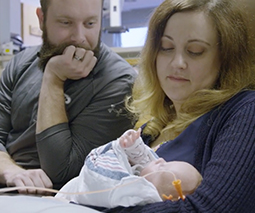It’s time to talk about male infertility and how you can help your partner

Infertility is incredibly tough for any individual or couple to face. However, when it comes to being “the guy’s fault” men can take it pretty hard. Here’s what you need to know about male reproductive issues and how to support your partner during this difficult time.
A common problem
Infertility affects one in six Australian couples and 40 percent of the time, it’s a sperm issue (female reproductive problems account for another 40 percent, and the other 20 percent is a combination or unknown). In fact, male infertility is the second biggest issue after a woman’s age, and yet, it’s not as widely addressed or discussed as female fertility problems, which is perhaps why many guys are shocked when they find out the reason they’re not conceiving is actually down to them.

The social stigma
When a man announces his wife or partner is expecting a baby, the response is usually something along the lines of, “way to go man!” or, “nice work!” compared to the “congratulations” women receive. While these statements may seem innocent enough, they actually imply that a woman getting pregnant is all the man’s doing rather than a joint effort. Therefore, when conception isn’t happening, and it’s highlighted as a male issue, it’s not uncommon for guys to then feel ‘less of a man’.
On top of this, men are traditionally not very good at talking about their feelings or seeking help when they need it. The result is a lot of men bottling up feelings of stress, anxiety, inadequacy as a partner and personal grief about potentially not being able to become a father.
Read more about male fertility:
- 10 things you need to know about sperm before you start trying for a baby
- These undies probably give dads-to-be stronger swimmers, according to science
- 5 fascinating sperm facts you need to share with your partner
What causes male infertility
The inability for a male to conceive is a direct result of either the production of sperm or the process in which it’s transported. This can be caused by:
- Blocked or absent tubes – called vas deferens – which is what’s cut during a vasectomy
- Low sperm count and poor quality sperm – they need to be able to propel themselves properly through the cervical mucus, uterus and fallopian tube
- High numbers of abnormally shaped sperm – they need to be the right shape to penetrate and fertilise the egg
- Inability to produce sperm
- Anti-sperm antibodies
- Sperm DNA fragmentation
- Genetic diseases such as cystic fibrosis or a chromosomal abnormality
The good news is that the most common causes of male infertility are diagnosed easily (usually from a sperm analysis), and most are treatable. However, it’s important that men get the support they need after a diagnosis.

Supporting your partner
Here are some of the many different ways you can support your partner:
- Open up communication – The critical thing is for guys to talk about what they’re feeling, so let them know you’re happy to talk about their fertility whenever they’re ready. This gives them a chance to get things off their chest, and for you to reassure him that you can work through this.
- Get informed – Don’t just take a diagnosis and do nothing about it. Book in to see a fertility specialist who will talk you through all the treatment options and lifestyle adjustments which could help get his fertility back on track, and other alternatives for having a baby.
- Encourage exercise – Staying active is a great mood lifter and will help guys get their mind off the problem by giving them something else to focus on that they can control. Exercise (along with Vitamin D) can also aid sperm production and reduce stress (another factor which can contribute to infertility).
- Get him to talk to other guys – A lot of men won’t feel comfortable talking to close male friends or family about their infertility problems, or even walking into a clinic. However, there are many online support groups out there where men can talk to others with the same or similar diagnosis.
- Spend time together – You’re in this together, after all, and are no doubt dealing with your own worries and anxiety over having a baby, so the more time you spend doing nice things together as a couple the stronger you’ll both feel. It doesn’t have to all be about the bedroom either. Even if you’re just cuddling up on the couch to watch a movie, they need to feel loved right now and secure in their relationship and that you’re not going anywhere.
Did your male partner suffer from infertility? What tips do you have for supporting other men in the same situation? Share on our Facebook page.









